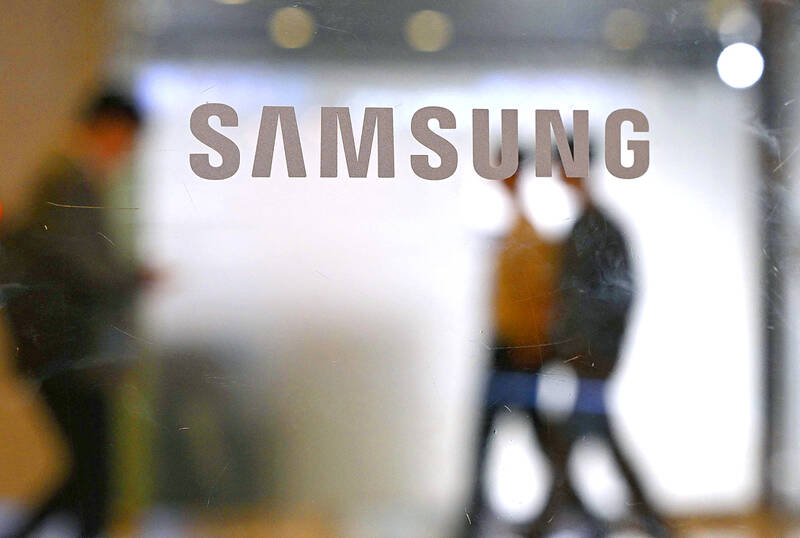Samsung Electronics Co has postponed taking deliveries of ASML Holding NV chipmaking equipment for its upcoming factory in Texas as it has yet to win any major customers for the project, three people familiar with the matter said.
Samsung has been also holding off on placing orders to some other suppliers for the US$17 billion factory in Taylor, prompting them to look for other customers and send staff deployed on site back home, three other people familiar with the matter said.
The delay in equipment deliveries is a fresh setback to the Taylor project, which is at the heart of Samsung chairman Jay Y. Lee’s ambition to expand beyond its bread-and-butter memory chips into contract chip manufacturing, which Taiwan Semiconductor Manufacturing Co (台積電) dominates.

Photo: AFP
ASML, the world’s biggest chipmaking equipment supplier, on Tuesday cut its sales forecast for this year, citing weakness in markets other than artificial intelligence and delayed fabs.
The Dutch company did not name clients who have delayed their fabs. Reuters is the first to report that Samsung has pushed back deliveries of some ASML equipment.
Two of the sources said the delayed shipments to Samsung’s Taylor factory involve ASML’s advanced chipmaking equipment called extreme ultraviolet (EUV) lithography.
One of them said the deliveries were scheduled earlier this year, but the machines have not been shipped yet. The third source said Samsung has pushed back delivery of some ASML equipment to the factory, without elaborating on the equipment or the revised delivery schedule.
EUV machines, which cost about US$200 million each, create design features on silicon wafers by using beams of light, and are widely used to manufacture advanced chips found in smartphones, electronic devices and AI servers.
Samsung in April said that production at the Taylor plant would begin in 2026 instead of this year.
Lee told Reuters earlier this month that the company was facing challenges on the factory.
Sources and analysts said there was a risk of further delays.
“Without new volume clients, even the 2026 timetable looks challenging... We see a possibility of a further delay and an asset write-off,” Macquarie analysts said in a report last month, adding that the fab could be “a stranded asset.”
BNK Investment & Securities analyst Lee Min-hee said that if Samsung does not place orders for other equipment by early next year, it could signal further delays, given the lead time required to start production.
The South Korean firm aims to complete construction of the building by early next year, a person familiar with the matter said.

NEW IDENTITY: Known for its software, India has expanded into hardware, with its semiconductor industry growing from US$38bn in 2023 to US$45bn to US$50bn India on Saturday inaugurated its first semiconductor assembly and test facility, a milestone in the government’s push to reduce dependence on foreign chipmakers and stake a claim in a sector dominated by China. Indian Prime Minister Narendra Modi opened US firm Micron Technology Inc’s semiconductor assembly, test and packaging unit in his home state of Gujarat, hailing the “dawn of a new era” for India’s technology ambitions. “When young Indians look back in the future, they will see this decade as the turning point in our tech future,” Modi told the event, which was broadcast on his YouTube channel. The plant would convert

‘SEISMIC SHIFT’: The researcher forecast there would be about 1.1 billion mobile shipments this year, down from 1.26 billion the prior year and erasing years of gains The global smartphone market is expected to contract 12.9 percent this year due to the unprecedented memorychip shortage, marking “a crisis like no other,” researcher International Data Corp (IDC) said. The new forecast, a dramatic revision down from earlier estimates, gives the latest accounting of the ongoing memory crunch that is affecting every corner of the electronics industry. The demand for advanced memory to power artificial intelligence (AI) tasks has drained global supply until well into next year and jeopardizes the business model of many smartphone makers. IDC forecast about 1.1 billion mobile shipments this year, down from 1.26 billion the prior

People stand in a Pokemon store in Tokyo on Thursday. One of the world highest-grossing franchises is celebrated its 30th anniversary yesterday.

Zimbabwe’s ban on raw lithium exports is forcing Chinese miners to rethink their strategy, speeding up plans to process the metal locally instead of shipping it to China’s vast rechargeable battery industry. The country is Africa’s largest lithium producer and has one of the world’s largest reserves, according to the US Geological Survey (USGS). Zimbabwe already banned the export of lithium ore in 2022 and last year announced it would halt exports of lithium concentrates from January next year. However, on Wednesday it imposed the ban with immediate effect, leaving unclear what the lithium mining sector would do in the